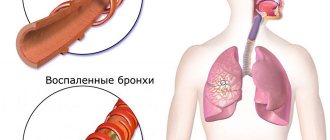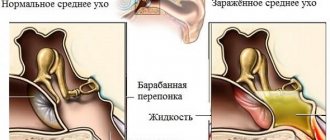Persistent cough in an adult
Coughing is a natural reaction to various respiratory irritants. In most cases, it occurs against the background of an infectious or viral disease. If the cough does not last long, then there is no need to worry. If the symptoms do not subside even after a month, then serious treatment is necessary. In this case, the susceptibility of the lungs becomes higher, and coughing occurs as a reflex.
Causes of persistent cough in adults
Sometimes patients stop taking medications prescribed by the doctor at the first improvement, especially antibiotics, then the cough can become protracted.
Another cause is smoker's bronchitis.
The danger of a long-term cough is that it becomes chronic. This can happen as a result of bronchitis, cancer, heart or lung pathology. A prolonged cough is accompanied by wheezing, heartburn, chest congestion, and hemoptysis. Sleep is disturbed, dizziness, increased sweating and urinary incontinence occur.
Adults often do not take this symptom seriously, and this can lead to serious consequences. Only a doctor can find out the cause and prescribe treatment.
Treatment of persistent cough in adults
The first step when visiting a doctor is to conduct examinations to rule out pneumonia, tuberculosis, asthma, and lung cancer. If the cause is established, cough suppressants based on menthol, honey, and codeine are prescribed.
A persistent cough can be treated at home. This is only permissible if it is not a symptom of a dangerous disease.
Boil ten onions and a head of garlic in a liter of milk until softened. Then add two tablespoons of honey and strain. Drink twenty milliliters every hour.
Take twenty-five grams of rose hips, wormwood, pine buds, yarrow and add one and a half liters of water. Boil for ten minutes and leave for a day. Strain and add one hundred grams of aloe and befungin juice, two hundred and fifty grams of honey and one hundred and twenty-five grams of cognac. Take a teaspoon three times a day half an hour before meals.
Add three drops of birch tar to one hundred grams of warm milk and drink on an empty stomach in the morning and before bed. Continue the course until complete recovery.
Treat yourself with a compress. To do this, heat a tablespoon of honey, flour, dry mustard, vodka, aloe juice, and interior fat in a water bath. Place gauze on your back. Lubricate the bronchial area with the mixture, put another layer of gauze, polyethylene and cover the top with a scarf. Fix and leave overnight.
For dry cough, eat a large onion three times a day with meals. Soon the mucus will begin to come off well.
Drink a tablespoon of flaxseed oil three times a day before meals. After five days the cough will be much less.
Do inhalations with essential oils of lavender and marjoram.
Gargle throughout the day every three hours with a soda solution. Dissolve a teaspoon of salt or soda in a glass of warm water and add three drops of iodine.
To treat cough, massage sessions are additionally prescribed.
The room needs to be humidified. Hot and dry air dries out the mucous membrane of the nose and respiratory tract, which leads to mucus stagnation. Try not to get too cold and during periods of widespread illness, avoid visiting crowded places. Stop smoking during the treatment period.
Protracted dry cough in an adult
A dry or unproductive cough is often a sign of colds: tracheitis, pharyngitis, bronchitis, acute viral respiratory disease. It comes in two types:
1. With a barking cough, a sore and sore throat occurs, and the voice disappears. This is typical for viral diseases or as a reaction to mechanical irritation of the mucous membrane;
2. Paroxysmal cough occurs more often with bronchitis and tracheitis. You may feel chest pain and difficulty breathing.
With this cough there is no sputum. An inflammatory process forms in the throat, excess mucus occurs, and a sick person wants to clear his throat.
The doctor prescribes antitussive drugs. Their action is aimed at relaxing the pharyngeal mucosa and reducing bronchial spasms. To get rid of a strong cough, sedatives are used to control it.
Prolonged, wet cough in adults
A wet cough occurs due to the accumulation of sputum in the lungs of the trachea. It often occurs after a dry cough and brings additional discomfort. He needs to be treated immediately. The lungs will begin to be cleared of sputum, which contains a large number of pathogenic bacteria.
When a wet cough does not go away for a long time, it becomes chronic. To thin the sputum, medications are prescribed that make it less viscous and remove it from the body. They are resorptive and reflexive. The first ones are made on the basis of iodides and sodium. The second are based on plant substances. During treatment, you need to drink as much liquid as possible - water, juices, herbal infusions.
kashelb.com>
Why does a person cough?
It will be much easier to understand how to stop a persistent cough if you know its causes. When a person coughs, in most cases it means that he is sick, and coughing is a reflex that helps restore patency of the airways. Thus, cough can be called a protective reaction of our intelligent body, aimed at getting rid of sputum accumulated in the lungs, bronchi, trachea, and sometimes from foreign particles or dust that have got there.
If adults or children become ill due to an acute respiratory infection, then a cough accompanying the disease may be a symptom:
- Laryngitis is an inflammation of the larynx, which is accompanied by a hoarse voice and a barking, rough cough.
- Tracheitis - inflammation of the trachea.
- Bronchitis is an inflammatory disease of the bronchi. Here the cough is initially dry, and then wet with a lot of sputum.
- Pneumonia is inflammation of the lungs.
Protracted cough in adults: causes and treatment of dry, prolonged cough
A cough is a reflex contraction of the respiratory muscles. In response to irritation of the mucous membrane of the bronchi, trachea, pleura and larynx, air is sharply expelled from the lungs.
At this point, the airways are cleared of foreign particles and mucus accumulation.
If a cough does not produce sputum (bronchial secretions), it is called unproductive or dry.
The opposite of it is a cough accompanied by phlegm. They call it wet.
Depending on the duration of the symptom, doctors divide it into several types:
- acute cough (less than 2 weeks);
- persistent cough (up to 4 weeks);
- subacute cough (up to 2 months);
- chronic cough (more than 2-3 months).
Causes and factors of prolonged cough in an adult
The most common cause of the development of this symptom is a complication of the course of diseases of viral and infectious etiology.
This occurs when the pathogen settles and actively multiplies on the mucous membrane of the bronchial tree. With untimely or poor treatment of colds and flu, a chronic cough occurs. For example, this happens when the disease was initially viral in nature and was treated with antibiotics. As a result of this “treatment,” the problem worsens and complications develop.
Some patients try not to take sick leave and suffer from colds on their feet. They still go to the doctor, but only after the body temperature rises and becomes seriously unwell. In this case, the infection managed to affect the lungs and bronchi.
Coughing and nasal secretions flowing into the larynx occurs with ailments:
- allergic;
- infectious.
Also, a prolonged cough occurs with chronic bronchitis, bronchial asthma and gastroesophageal reflux, when the contents of the stomach enter the esophagus.
In some cases, a dry, prolonged cough can be a side effect of certain medications for hypertension and heart failure. The drug Enalapril has similar properties.
Smokers often complain of a lingering cough with phlegm, especially after suffering from a cold or viral illness. In these patients, the mucous membrane of the respiratory tract differs significantly from the state of the bronchial tree of a healthy person. Also, people who smoke have a weakened immune system and cannot cope with infections.
The causes of prolonged cough with or without phlegm may be hidden under allergies. Receptors of the mucous membrane of the larynx and bronchi become extremely sensitive to any irritants:
- cigarette smoke;
- dust;
- pet hair;
- pollen from trees and flowers.
It is important to emphasize that a prolonged cough in an adult without other symptoms can be a signal of the presence of dangerous diseases, for example, cancer or pulmonary tuberculosis.
Without timely and adequate treatment, a lingering cough with sputum develops into diseases:
- pneumonia;
- pleurisy;
- lung abscess;
- bronchial asthma.
These pathologies pose a danger to the patient's life. Therefore, it is extremely reckless to self-medicate or ignore it altogether!
To make a correct diagnosis, a therapist, otolaryngologist or pulmonologist will refer the patient to undergo a series of tests and examinations. You will need to donate blood from a finger, veins, and sputum. The patient needs to have an X-ray of the lungs and undergo an external respiration test:
- spirography;
- body plethysmography;
- spirometry.
How to treat an old cough
Based on the patient’s condition, the results of his tests and symptoms, the doctor will recommend a specific treatment regimen.
In this case, it will be necessary to transform a prolonged non-productive cough into a wet productive one (with sputum). For these purposes, an expectorant is prescribed. Such medications promote high-quality discharge of bronchial secretions.
As a supplement, you will need to take medications that stimulate expectoration: resorptive, reflex action, diluting sputum. These are usually classified as:
- mucolytics;
- cysteine preparations;
- proteolytics.
Depending on the nature of the prolonged cough with sputum, the person will need to be treated with antihistamines and antimicrobials.
Treatment of a lingering cough, if it is dry, is carried out with medications containing codeine. At night, to relieve irritation, the chest and back of an adult are rubbed with warming ointments.
Inhalations are quite effective. They are carried out using an inhaler:
- ultrasonic;
- compressor
If such a device is not at hand, improvised means are quite suitable. Healing vapors of drugs, together with air currents, penetrate the bronchi and improve their condition. It is possible to achieve restoration of the mucous membrane, increased blood supply, and improved sputum removal.
Sometimes it doesn't hurt to inhale the vapors coming from a pan of hot liquid. You can infuse medicinal herbs or breathe over potatoes. Decoctions of elderberry, raspberry, linden blossom, coltsfoot, and sage are used.
You can inhale with aromatic oils. The product has an anti-inflammatory and analgesic effect. To treat a cough, take a shallow container and pour warm water into it (about 40 degrees). Add a couple of drops of essential oil to the liquid:
- mint;
- eucalyptus;
- menthol.
Then cover your head with a terry towel, bend over the container and inhale the vapor for 5-7. After half an hour, the procedure will need to be done again.
Chronic cough with sputum in an adult can be treated with warm-moisture inhalation. The thermal effect helps to liquefy mucus and remove it from the lumen of the bronchi. In addition, dry mucous membranes are eliminated.
Antibiotics, hormonal medications, sulfonamides and other ingredients recommended by the doctor are added to warm pharmaceutical saline solutions.
Sometimes inhalations for coughs are made with soda solutions or alkaline mineral waters. The duration of such treatment is no more than 10 minutes. If your cough is dry, baking soda is not suitable. This remedy will provoke:
- even greater drying of the mucous membrane;
- worsening tickling and cough.
Folk remedies
You can cure a prolonged cough with folk remedies.
It is useful to inhale hot infusions of garlic and onions. Vegetables are peeled, cut into small cubes and poured into a ceramic teapot by a quarter. Boiling water is added to the onions and garlic and the steam begins to inhale for a while through the spout of the kettle. Another treatment for a lingering cough can be done with cupping. It is advisable to use special small medical jars with a rounded bottom. However, it should be borne in mind that you need to treat a cough in this way with an assistant.
A decoction of linden blossom will help cure a prolonged cough with phlegm. It is enough to pour 3 tablespoons of dry inflorescences with one glass of boiling water. Means:
- keep in a water bath for 15 minutes;
- allow to cool;
- filter;
- taken three times a day.
Thyme infusion has expectorant properties. The herb (2 tablespoons) is poured into 250 ml of boiling water and heated in a water bath for 20 minutes. Then filter and drink 3 times a day.
If the cough has been bothering you for a long time, a decoction of tricolor violet will help get rid of it. For treatment, add a tablespoon of crushed dry raw materials to a glass of boiling water. Prepare the product using the technology described above.
Whatever the reason, a prolonged cough should be treated! Otherwise, after some time it will develop into a chronicle and seriously complicate the patient’s life. Treatment will require a lot of effort, time and finances.
The video in this article will help you figure out what to do if you have a prolonged cough.
stopgripp.ru>
Attack of severe cough: how to stop with folk remedies
- tea brewed from chamomile;
- milk with butter added to it;
- a mixture of milk, egg yolk and a pinch of soda.
This “medicine” will need to be taken in small sips, as a result of which you will soften the larynx and make your cough much quieter or eliminate it completely. If the attack happened at night, you can continue to sleep peacefully. During the day, even such remedies will give you the opportunity to wait for some time in order to take more powerful medications.
A similar effect can be achieved by sucking pre-prepared cubes consisting of fatty butter and candied honey. This lozenge also allows you to remove inflammation and save you from another coughing attack. As a result, you will also be able to continue doing your business as usual.
If the coughing effect leads to suffocation, it makes sense for you to use black radish against it. To do this, cut out the core from it and pour a certain amount of honey into it. By the way, it can be replaced with regular sugar. The fruit is left alone for ten hours, while it must be in water.
Antiseptics
Warming up is one of the methods of physiotherapy, which is recommended to be done as soon as the disease begins to recede. In acute cases of the inflammatory process, it is impossible to warm up or rub the chest.
The doctor prescribes warming to quickly eliminate the consequences of the disease:
- Warming compresses should not be applied to the heart area.
- Compresses should be distributed on the right and left along the spine at the level of the bronchi.
- Warming up at elevated temperatures is contraindicated.
- Before heating, apply a thin layer of cream to the skin and place a thin cloth. Then distribute the compress and cover again with a thick cloth.
- At the end of the procedure, wipe the skin dry and change the patient into clean clothes.
For warming up you can use:
- Warm mashed potato scones.
- Mustard plasters.
- Badger or goose fat.
- Banks have a targeted effect, increasing blood flow and lymph movement.
Without the supervision of a doctor, warming up can become not a useful procedure, but a dangerous one for health.
The principle of operation of the inhaler is based on the entry of microparticles of drugs into the respiratory tract:
- Solutions for inhalation Lazolvan, Atrovent.
- Fluimucil to reduce the viscosity of sputum in a dosage of 3 ml.
- Dioxidin 5%.
- Interferon with saline solution.
- A mixture of essential oils: eucalyptus, mint, sage. Mix 2 drops of each type of oil with 200 ml of water.
- A mixture of infusions of anti-inflammatory and antitussive herbs.
- Aqueous solutions of propolis, grape juice, sodium chloride.
- Juice from Kalanchoe, onion or garlic mixed with saline solution.
For different types of cough, different types of inhalations are effective. Inhalations, like drug treatment, are prescribed by a doctor.
All of them consist of natural ingredients, so they can be taken simultaneously with the main treatment:
- A decoction of onion and garlic with milk works quickly and effectively. Mix finely chopped onion and garlic with milk and cook until the vegetables are ready. Mix the prepared decoction 1 tbsp. l. honey and take 1 tbsp. l. 6-7 times a day.
- A fast-acting folk remedy for coughs is onions with honey, baked in the oven. Mix the chopped onion with honey and place in the oven. Bake for 2 hours at 100°. Take the resulting onion puree 2-3 times a day, 1 tbsp. l.
- Mix honey with chopped fresh garlic and leave overnight. Then take 1 tbsp. l. several times a day.
- A proven effective cough remedy is black radish with honey. The center of the vegetable is cut out, removing the inner part to make a radish bowl. The inside is filled with honey and left in the refrigerator for 1 day. The resulting mixture of juice and honey is taken 1 tbsp. l. 4 times a day.
Whatever traditional methods are used, before using them you need to consult a doctor who will help you choose the most effective one.
- Prepare 0.5 kg of onion, 0.5 kg of sugar and 50 g of honey. Peel the vegetable. Finely chop and place on the bottom of the pan. Next, add sugar and add half a liter of water. Boil the mixture for 2 hours over low heat, then pour into a glass container and mix with honey. Take the finished product 5 tablespoons after meals for a week.
- Take 5 drops of olive oil per tablespoon of honey and mix. Take 1 teaspoon twice a day.
- Peel 2 bananas, chop them, add 200 g of water. Cook for a couple of minutes, then add a tablespoon of honey and let cool. Take the medicine 2-3 tablespoons up to 3 times a day.
Prolonged cough
Causes of prolonged cough
Cough itself is not a disease.
Cough is a symptom that occurs when air encounters any obstruction in the respiratory tract. Of course, there is no point in running to the doctor if there is slight discomfort and a sore throat, but if the cough does not go away, you should consult a doctor. A cough that does not go away for four to eight weeks is considered long-lasting. If a prolonged cough occurs, it is necessary to carry out a diagnosis as soon as possible. Diagnostics includes: mandatory x-ray examinations, external respiration examination, blood tests, and, if necessary, more complex diagnostic procedures.
There can be many reasons for a cough. Depending on them, the cough itself changes.
Cough may be a symptom of, for example, gastroesophageal reflux disease. With it, sudden movements of the body provoke the contents of the stomach to enter the esophagus, which gives rise to heartburn and cough.
With bronchitis and pneumonia, cough appears from the presence of phlegm in the lungs.
Cough may occur with lung cancer. Then it is dry or with rare release of light sputum.
Cough with bronchial asthma is very difficult to stop. Often, it occurs against the background of excessive smoking and is identified by accompanying whistling sounds. This is especially evident in the morning hours.
Cough with whooping cough begins in attacks. It is exhausting because... attacks can be very frequent - repeated up to 12 times.
With heart disease, a dry cough also occurs. In this case, the cause is stagnation of blood in the lungs. It causes a feeling of lack of air.
And of course, do not forget about coughs, which are caused by acute respiratory diseases. It usually causes a sore throat and sore throat.
Prolonged cough in a child
The mucous membranes of the respiratory tract are covered with ciliated epithelium; in the body it performs a protective function and helps the respiratory tract get rid of foreign bodies. During this process, a cough appears.
If a child’s cough does not go away within a month, despite being treated, it is considered long-term. In this case, your pediatrician should refer you to other specialists for a more detailed examination, conduct a Mantoux test and prescribe the necessary tests.
The cause of a prolonged cough in a child may be: fungal infections, they usually appear after treatment of an infectious disease with antibiotics; damage to the respiratory tract by roundworm larvae; viral diseases, which make it difficult for children to cough; purulent lung diseases; chronic respiratory diseases; various allergic reactions.
Prolonged cough in adults
The causes of prolonged cough in adults are the same as in children. Depending on the causes of a prolonged cough, it is observed with such symptoms as: blood in the sputum, whistling when breathing, wheezing, nasal congestion and heartburn. In addition, a prolonged debilitating cough provokes headaches, dizziness, impaired sleep quality, and urinary incontinence.
In order to identify the cause of a prolonged cough as quickly as possible, it is necessary to describe to the doctor as accurately as possible what exactly is bothering you and what symptoms accompany the cough. Often a chronic cough is the only symptom of a disease such as asthma.
Prolonged dry cough
In order to get rid of a long-term dry cough, it is not enough to carry out only symptomatic treatment. Even if you manage to relieve an attack of dry cough without getting rid of the cause, the attacks will appear again and again and have an increasing tendency. In addition, if treated incorrectly, bronchial asthma can develop. Therefore, before starting treatment, it is necessary to identify the cause. A prolonged dry cough can be provoked by: fungal infections; burns of the respiratory tract with hot air; smoking, including passive smoking; entry of small foreign bodies into the bronchi; allergy; chemical damage.
The pathogenesis of the development of dry cough includes many factors; a visit to the doctor will help to understand them and identify the cause.
Prolonged cough with phlegm
There can be many reasons for the occurrence of cough with sputum, and among them there are very serious diseases. In order to diagnose them, it is necessary to clearly formulate what kind of sputum is bothering you. Sputum is mucus that contains white blood cells, leukocytes, particles of dead tissue of the respiratory tract and waste products of microorganisms and bacteria that cause diseases. The sputum may be white, yellow, green, gray or even black, sometimes with blood present. The nature of sputum and the timing of coughing attacks help determine the disease. Green sputum indicates the presence of pus in the respiratory tract. Its abundance means that a large abscess has ruptured in the lungs. But such sputum can also be a consequence of sinusitis. A cough with thick, curd-like sputum can indicate both fungal diseases and tuberculosis. A cough with thick, difficult-to-clear sputum may indicate diseases of the gastrointestinal tract. Black and gray sputum with an unpleasant putrid odor indicates the presence of cancer. Usually doctors can determine the cause of a prolonged cough with the formation of sputum, but sometimes there are cases when this cannot be done. Then you have to carry out treatment by trial and error.
Prolonged cough without fever
Almost every person has encountered such a problem as a cough without fever. Few people attach serious importance to it, but in vain, such a cough can be a symptom of a hidden viral infection. For some reason, when an infection occurred, the body did not want to fight it by raising the temperature. Heart disease, sexually transmitted diseases, allergies, respiratory diseases, bronchitis, pneumonia, all these diseases can cause a prolonged cough without fever. Pulmonary tuberculosis is a very dangerous disease that causes a prolonged cough without fever; even with timely diagnosis and treatment, it can lead to complications. It is especially worth paying attention to cough during pregnancy. It is difficult to treat, since most medications are contraindicated for the expectant mother. And severe coughing attacks can lead to serious complications, including termination of pregnancy.
Treatment of prolonged cough
Depending on the type of cough, treatment is prescribed. There are methods that will help alleviate the manifestation of the cough reflex, regardless of the reasons for its occurrence. Firstly, you need to quit smoking. Don't forget to humidify the air, this will help remove mucus. Drink more fluids, at least two liters of water, it thins and removes mucus. Do inhalations using essential oils, they will soften the mucous membranes and help you breathe easier. In order to cure a dry cough, you need to soften the mucous membrane. It is also necessary to get rid of the irritant that causes the cough. Lollipops, as well as gargling with herbs, furatsilin solution, and salted water give a quick effect. These procedures will help relieve a coughing attack, but not for long. Drugs that have an antiseptic, enveloping and anti-inflammatory effect have a longer lasting effect. There are drugs that can suppress the cough reflex in the brain, but they should not be used under any circumstances without a doctor’s prescription.
In the treatment of wet cough, medications that thin the mucus by increasing sputum will help; they have antibacterial properties and improve sputum discharge. There are traditional methods to combat cough. A compress of mustard plasters applied to the chest and back (contraindicated at fever). Inhalations using essential oils. Hot foot baths with mustard powder. Black radish juice with honey. In any case, if you experience a long-term chronic cough, do not delay visiting your doctor. After all, in order to get rid of an annoying cough, you need to get rid of the cause of its occurrence. Go to specialists, do x-rays and other necessary tests.
kashelb.com>
When the disease just begins
Now let's find out how to stop a cough that starts. If you have a slight cold and start coughing, then you need to start acting immediately! Something as simple as gargling frequently with a warm solution of salt and baking soda can work wonders in some cases. A classic decoction of calendula and sage with chamomile is also great for rinsing. You don’t have to make it yourself, but buy Rotokan tincture at the pharmacy (it includes all three components) and gargle with it, diluting it in water in the following proportion: 1 tbsp. spoon per glass of warm water.
If there is no elevated temperature, you can steam your feet at night and then put on woolen socks. Pepper patch is another effective remedy. We stick it on the chest and back. If your cold symptoms do not subside in the morning, it is best to seek medical help.
How to treat a persistent dry cough
A lingering dry cough is usually treated with the help of drugs that inhibit the cough center in the brain and promote the transition of a dry cough to a wet one. Inhalations and massage are effective treatments for dry cough.
You will need
- “Hydrocodone”, “Codeine”, “Demorphan”, “Ethylmorphine hydrochloride”, “Codipront”, “Morphine chloride”, “Glauvent”, “Sedotussin”, “Tusuprex”, “Pakseladin”, “Sinekod”, “Libexin”, “Butamirat”, “Levopront”, “Helitsidin”, coltsfoot herb, chamomile flowers, thyme, sage, baking soda, menthol and eucalyptus oils.
Instructions
- A lingering dry cough lasting from a week to a month or more can bring quite a lot of anxiety to its owner. A person's sleep and appetite are disturbed, discomfort occurs in the nasopharynx, heaviness in the chest, wheezing in the lungs, etc. With pneumonia, acute respiratory viral infections, acute respiratory infections, influenza and other viral diseases of the nasopharynx and lungs, a dry cough most often turns into a wet one. But what to do if this does not happen, and how to treat a lingering dry cough?
- First of all, it is necessary to find out the nature of such a cough. One of the common causes of prolonged cough is asthma. A lingering cough is typical for smoker's bronchitis, diseases of the cardiovascular system, lesions of the pulmonary structures, benign tumors and allergies. Having found out the cause of the cough, it is necessary to begin treatment of the underlying disease, simultaneously eliminating its symptoms.
- It is possible to suppress a cough completely or partially with the help of medications that inhibit the cough center in the brain and the nerve endings of the receptors. In the absence of sputum and a dry, lingering cough, drugs with or without a narcotic effect are used. The first group includes Hydrocodone, Codeine, Demorphan, Ethylmorphine hydrochloride, Codipront and Morphine chloride. The second group includes Glauvent, Sedotussin, Tusuprex, Pakseladin and Sinekod.
- Medicines such as Libexin, Butamirat, Levopront and Gelitsidin can help a dry cough move to the next stage, accompanied by sputum discharge. These medications, unlike narcotic drugs, are not addictive and do not lead to drug dependence, so they can be safely used for children. Treatment with all of the above drugs must be stopped as soon as the cough becomes wet. Otherwise, the antitussive will disrupt the cleaning of the lungs. As a result, sputum will accumulate in them, disrupting the ventilation of the lungs and leading to the development of pneumonia.
- Inhalations are an effective treatment for dry, lingering cough. They can be prepared both on the basis of traditional medicines and on the basis of medicinal herbs. For example, to prepare inhalation, you need to mix one tablespoon of coltsfoot herb, chamomile flowers, thyme and sage, pour 0.5 liters of boiling water over the mixture, strain after an hour and add a teaspoon of baking soda, a few drops of eucalyptus and menthol oils. This inhalation should be done 3-5 times a day.
- A lingering cough can be eliminated by light massage treatments. Tapping and patting in the lung area with slight pressure will help remove mucus from the walls of the respiratory tract and alleviate the patient's condition.
KakProsto.ru>
Complications and prevention
The main goal of prevention is to prevent seasonal diseases such as flu and colds. This is achieved through vaccination, regular exercise, proper nutrition and avoiding contact with sick people. Smokers need to give up their bad habit. It is necessary to avoid stressful situations, hypothermia, allergens and treat underlying diseases.
Cough, as a rule, does not appear in the patient as an independent symptom, but is a consequence of some disease. At the same time, it causes sleep disturbances, irritability, and fatigue. If the symptom is very strong and intrusive, as with whooping cough, there is a danger of loss of consciousness and even respiratory arrest. Vomiting often occurs.
Cough, which is one of the manifestations of chronic respiratory diseases with obstruction, may be accompanied by progressive shortness of breath and an increase in pulmonary heart failure. To prevent all this from happening, you need to monitor your health and adhere to some preventive measures:
- avoid hypothermia and stress;
- strengthen immunity;
- do hardening and gymnastics;
- to refuse from bad habits;
- observe the work and rest schedule;
- avoid contact with toxic and allergic substances;
- lead a healthy lifestyle.
Video about dry cough (Doctor of Medical Sciences K.A. Zykov), watch to the end.
Alkaline inhalation
Traditional medicine offers a lot of options on how to stop coughing. An interesting effective way is alkaline inhalation at home. The procedure is done like this: pour mineral water into a pan (if you pass the water through a special magnetic funnel, its properties will be enhanced), bring the liquid to a boil, cool to 70 degrees.
Well, after that you need to bend over the saucepan, cover yourself with a towel and breathe in the beneficial steam for about 10 minutes. Then it is recommended to drink hot tea with raspberries, wrap yourself up warmly and sleep. Such inhalations help relieve cough with the presence of viscous sputum in the respiratory tract.











